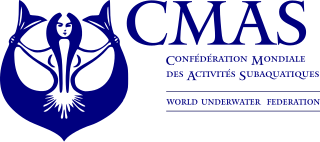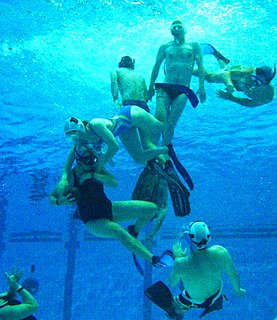 W
WAssociation Internationale pour le Développement de l'Apnée (AIDA) is a worldwide rule- and record-keeping body for competitive breath holding events, also known as freediving. It sets standards for safety, comparability of Official World Record attempts and freedive education. AIDA International is the parent organization for national clubs of the same name.
 W
WThe British Sub-Aqua Club or BSAC has been recognised since 1954 by UK Sport as the national governing body of recreational diving in the United Kingdom.
 W
WThe Cave Diving Group (CDG) is a United Kingdom-based diver training organisation specialising in cave diving.
 W
WConfédération Mondiale des Activités Subaquatiques (CMAS) is an international federation that represents underwater activities in underwater sport and underwater sciences, and oversees an international system of recreational snorkel and scuba diver training and recognition. It is also known by its English name, the World Underwater Federation, and its Spanish name, Confederación Mundial De Actividades Subacuáticas. Its foundation in Monaco during January 1959 makes it one of the world's oldest underwater diving organisations.
 W
WGreen Fins is an approach to sustainable marine tourism activities operating in South East Asia, Caribbean and the Indian Ocean that works with business operators, communities and governments. It helps to implement environmental standards for the diving and snorkelling industry through a code of conduct. The overall aim of the initiative is to mitigate damaging impacts to the marine environment from the marine tourism sector and improve sustainability. The code of conduct is a set of 15 points designed to tackle the most common and detrimental effects of SCUBA diving and snorkelling activities on the habitat in which they operate.
 W
WThe Historical Diving Society (HDS) was formed in 1990 in the United Kingdom by a group of enthusiasts whose aim is to preserve and protect diving heritage. The Society has since grown into an international organisation with affiliated national societies across the world. Active societies in North America, Europe and Australia collaborate and work together with the HDS towards the same goals.
 W
WThe Nautical Archaeology Society (NAS) is a charity registered in England and Wales and in Scotland and is a company limited by guarantee.
 W
WThe Naval Air Command Sub Aqua Club (NACSAC) was an organisation within the Royal Navy that oversaw sports and technical diving training activities for naval aviation and fleet units. Today it has branches at RNAS Culdrose and RNAS Yeovilton. Both bases provide training, and club members regularly dive in their local areas on weekends. Diving instruction, from beginner to advanced level, is offered under the auspices of the British Sub-Aqua Club. In 2005 NAC-SAC was closed down as an organisation in favour of a Royal Navy Sub Aqua Club, which is what Lieut. Graham and CPO Larn had wanted from the outset of NAC-SAC which was only given that title since HMS Vernon, the RN Diving School at Portsmouth, would not support the idea of sport diving within the service.
 W
WThe Sea Research Society (SRS) is a non-profit educational research organization founded in 1972. Its general purpose is to promote scientific and educational endeavors in any of the marine sciences or marine histories with the goal of obtaining knowledge for the ultimate benefit to mankind. It does both archival research and underwater expeditions in search of historic shipwrecks.
 W
WThe South African Underwater Sports Federation (SAUSF) is the official CMAS representative in the Republic of South Africa, and is affiliated to the South African Sports Confederation and Olympic Committee (SASCOC).
 W
WUnderwater rugby (UWR) has been played in Australia since 2007 and as of 2016 is played in every State and the Australian Capital Territory.